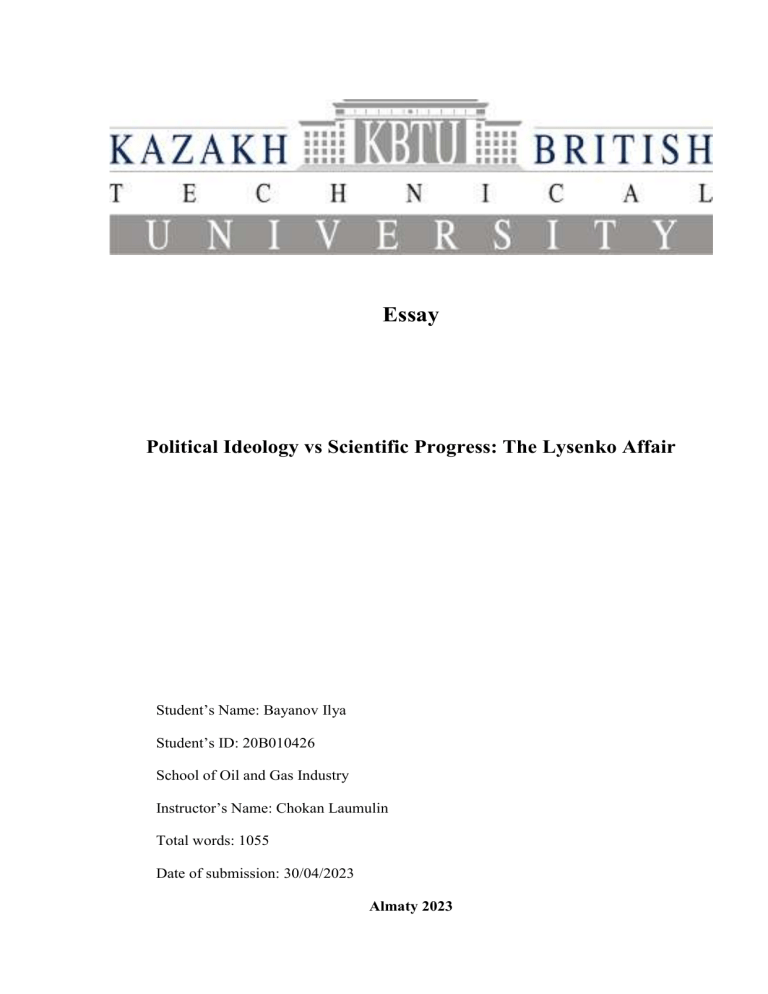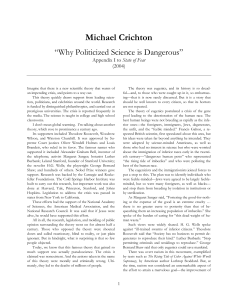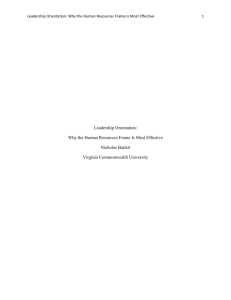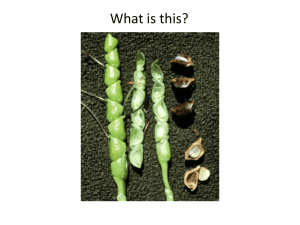
Essay Political Ideology vs Scientific Progress: The Lysenko Affair Student’s Name: Bayanov Ilya Student’s ID: 20B010426 School of Oil and Gas Industry Instructor’s Name: Chokan Laumulin Total words: 1055 Date of submission: 30/04/2023 Almaty 2023 In the 1920s and 1930s, a significant number of discussions took place across various areas of science, art, and literature. These discussions were marked by a sharpness of character, and often featured significant differences in opinions, approaches, methods, and assessments of facts. This phenomenon is a natural one within the scientific community but was exacerbated by the historical situation of the time. During this period, mass repressions and the search for "enemies of the people" created an atmosphere in which most discussions, regardless of the sphere in which they took place, turned into struggles with political overtones. Political labeling was a seductive and frequently used tactic for defeating opponents who could not be defeated through the power of scientific reasoning. Unfounded political accusations were commonplace in such discussions, and many disputes ultimately led to tragic outcomes. The discussion in the field of genetics and selection was no exception to this period in the development of scientific discourse. It too was marked by political struggles and unfounded accusations, which ultimately had a significant impact on the field's development. Despite this, however, it is worth noting that these struggles and debates did not occur in a vacuum, but rather were influenced by the broader political and social context of the time.[1] Supporters of the heredity of acquired traits under the influence of the environment (Lamarckists) and opponents of this theory, genetics of the classical direction. Each of the groups tried to declare its point of view the only true one, corresponding to Marxism and dialectical materialism. The main argument of geneticists in favor of the materialism of their concepts was the factual material of the then, mainly foreign genetics, while the Lamarckists had less extensive and controversial material. However, one argument in favor of the Lamarckian position was the idea put forth by F. Engels in his work "The Part Played by Labor in the Transition from Ape to Man." Nevertheless, geneticists were able to support their position more effectively with theoretical argumentation and a stronger foundation of empirical evidence. Despite this, during 1931-1932, many geneticists who followed classical genetics were labeled as holding "Menshevik idealism" in the field of philosophy - a trend that was condemned by Joseph Stalin. [1] Trofim Denisovich Lysenko's rise to prominence as a scientist and state official in the Soviet Union was deeply intertwined with the country's history and scientific developments. After enrolling in correspondence classes at the Kiev Agricultural Institute in 1921, Lysenko quickly became part of a new generation of Soviet agricultural scientists who were tasked with revolutionizing the country's farming practices. In 1929, the Lenin All-Union Academy of Agricultural Sciences (VASKhNIL) was established, and leading plant scientist Nikolai Vavilov was appointed its president. The shortage of qualified personnel for these new institutions, coupled 2 with a campaign against "old bourgeois specialists" following the infamous 1928 "Shakhty Trial," helped to accelerate Lysenko's ascent up the academic ladder. [2] Lysenko's theories, which focused on plant physiology and concepts like vernalization and "phasic development," gained more influence in the Soviet Union as his institutional power grew. With the help of philosopher Isaak Prezent, Lysenko expanded his theories into a broader doctrine called "Michurinist biology", which connected vernalization with heredity and evolution. This doctrine was also known as "Soviet creative Darwinism," as it incorporated Darwinism into the official Soviet ideology of Marxism. Through this expansion, Lysenko was able to shape research in fields beyond plant physiology and gain greater influence over Soviet science.[2] At the core of Michurinist biology was the idea that external conditions could transform heredity. Lysenko believed that vernalization, the process of exposing plants to cold temperatures to induce flowering, not only affected their physiology but also their heredity, resulting in a change from "winter" to "spring" varieties. Plant grafting, a technique favored by Ivan Michurin, also provided Lysenko with a means to "transform" heredity. He interpreted the mutual influences of the scion and rootstock in grafts as "vegetative hybridization," which perpetuated these influences in the offspring's heredity. Lysenko claimed that these vegetative hybrids exhibited hereditary characteristics of both parental plants and transmitted them to the progeny in the same way as sexual hybrids.[2] The political struggle of the time was used to settle scientific debates, including the discussion on the inheritance of acquired traits. I.I. Prezent, who considered himself a specialist theorist on Darwinism, formed a "creative association" with T.D. Lysenko, which reignited the discussion. However, Prezent was unable to conduct independent experiments and instead used political demagogy in debates, particularly in a discussion with Prof. B.E. Raikov, an outstanding scientific Darwinist. This led to a slanderous campaign against Raikov, resulting in his arrest, along with many of his students, and the coining of the term "Raykovshchina". Despite this, Raikov was later rehabilitated and continued to contribute to the field of science. Even some of the most educated agronomists, such as A.G. Doyarenko, Krutikhovsky, and Chayanov, were in 1931-1932.[1] The controversy surrounding Lysenkoism and the opposition to classical genetics continued for several decades until the resignation of N.S. Khrushchev in 1964. In October of that year, the geneticist I.A. Rappoport was urgently called to write an article on the achievements of classical genetics for the newspaper "Selskaya zhizn"(Rural life). The article condemned Khrushchev's support of Lysenko, among other things. Lysenko was eventually removed from his 3 position as director of the Institute of Genetics in February 1965.[1] The end of Lysenkoism is generally considered to have occurred between 1964-1966. Although Lysenkoism did receive some support in Hungary, Romania, and Italy, it ultimately lost its influence in the scientific community[3]. In conclusion, the Lysenko affair was a dark period in the history of Soviet genetics marked by the suppression of scientific inquiry and the persecution of scientists. The promotion of Lysenko's theories and the suppression of classical genetics led to a significant setback in the development of biology in the Soviet Union. The ideological struggle for the dominance of science within the framework of Marxism-Leninism became the dominant factor in scientific research, and the scientific principles were subordinated to political interests. However, the resistance of some scientists, the publication of critical articles, and the support of international scientific communities played an essential role in ending the Lysenko era. The case of Lysenko serves as a cautionary tale of the dangers of politicizing science and the importance of scientific freedom and integrity. 4 Bibliography [1] Zh. Medvedev. (1993). Vzlet i padeniye Lysenko. Istoriya biologicheskoy diskussii v SSSR, 1926-1966. (The rise and fall of Lysenko. History of biological discussion in the USSR, 19261966). [2] deJong-Lambert, W., & Krementsov, N. (2017). The Lysenko Controversy as a Global Phenomenon, Volume 1: Genetics and Agriculture in the Soviet Union and Beyond. Palgrave Macmillan. [3] deJong-Lambert, W., & Krementsov, N. (2017). The Lysenko Controversy as a Global Phenomenon, Volume 2: Genetics and Agriculture in the Soviet Union and Beyond. Palgrave Macmillan. 5



